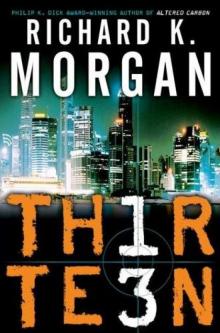- Home
- Richard K. Morgan
Black Man / Thirteen Page 32
Black Man / Thirteen Read online
Page 32
“Whatever works, I guess.”
“Yeah, well. Worked for a while.” Nevant snorted disgustedly and knocked back another chunk of his raki. “Manco was so fucking pleased with himself, he couldn’t see it’d crash and burn soon as one of his fake pistacos got called and couldn’t cut it. I told him—the way I had it mapped out, he could have that monster threat for real. Real, honest-to-DNA monsters doing his enforcing for him. Something to scare everybody, not just the illiterates. Just think what would have happened if the word got around: Cross the familias and they’ll send a fucking thirteen to visit you.”
“Always assuming you and your future army of thirteens could cut it any better than tayta Manco’s fakes.”
Nevant looked at him. “You lose many fights to a normal human recently?”
“No. But like you just got through telling me, it isn’t the facts that do it for humans. Maybe Manco didn’t need a real threat. Or at least, he didn’t need it badly enough to cuddle up with a bunch of fucking twists.”
“Didn’t have any problem cuddling up to that hib cunt Jurgens,” said Nevant sourly. “Amazing how your prejudices can go out the window when there’s a decent rack in the equation.”
“Greta Jurgens?” Carl summoned vague recollection of a languid, gray-eyed blonde from his inquiries after Nevant three years back. She’d been running front-office operations for Manco in Arequipa. “She was a hibernoid?”
“Yeah, she was. Why?”
Carl shrugged. “No reason. Just the way Manco was about the whole twist thing, it’s strange he’d tolerate one that far up the ladder on the inside.”
“Like I said, check out the rack. The ass. And hey, for all I know, hibs do some dickshift tricks you can’t get out of a human woman.”
Carl sipped his drink, shook his head. “That’s bonobos, and even then it’s bullshit hype. Anyway, Manco wants that kind of thrill, he can go down to Lima and have his pick of twist brothels. Come on. It doesn’t add up.”
“Well then, maybe it’s just that there are twists and twists.” Nevant’s lip curled. “Not many people are scared of the ones whose party piece is curling up and sleeping for four months at a time. Doesn’t threaten your masculinity much, that. It’s only people like us they feel the need to lock up and stop breeding.”
Carl gazed at the cutlery on the table. He nodded, a little sadly. “People like you. They lock people like you up. Me, I’m licensed.”
“Domesticated, you mean.”
“Call it what you like. You can’t turn the clock back twenty thousand years, Stefan.”
Nevant unsheathed the wolf-snarl grin again.
“Can’t you?”
“See, once upon a time,” Yavuz was saying, “fear was a unifying force. Back then, you could make a country strong with xenophobia. That’s the old model, the nation-state fortress thing. But you can’t live in a fortress when your whole way of life depends on globalized interdependence and trade. Once that happens, xenophobic tendency becomes a handicap, in Groombridge’s terms a non-adaptive trait. She cites—”
Down the promenade, the splintering crack of glass. Sevgi whipped about in time to see the restaurant window shattered outward around two grappling bodies. Someone shrieked.
“Ah, fuck.”
She grabbed after the gun she wasn’t permitted to carry here, blind fingers registering the lack ahead of conscious thought. Flung herself off the stool—it teetered and toppled behind her, she heard it go down clattering—and toward the fight. Yavuz was at her side, brandishing an authorized pistol…
On the floor, the pale thirteen had Marsalis pinned. His arm hauled up, something in it, slashed down. Somehow, Marsalis twisted aside, did something with his legs that shifted the balance of the fight. Nevant reeled, shaking a hand that must have hit the concrete floor with killing force, must have broken bones. He was trying to keep the black man down with his other arm, but the lock wasn’t working. Marsalis skated sideways by fractions, his shoulder slipped loose. His hand flapped, grabbed, pulled the Frenchman down toward him. He hinged upward from the stomach, hard, met Nevant’s face with the crown of his skull. Sevgi heard the noise it made, and her teeth went on edge.
They arrived.
“That’s it, motherfucker.” Yavuz, in English. Voice shocked hoarse, pistol jammed in Nevant’s ear. “Game over.”
Nevant swaying, one hand clutched to his face, blood dripping between fingers from a nose that had to be broken. Coughing, bubbling, but through it came laughter. Marsalis grunted and tugged himself out from beneath, folded a leg, and shoved the Frenchman sideways with his knee. Nevant went halfway to collapsing, still clutching his face. Still chuckling. The hand he was using was the same one he’d just broken on the concrete.
“Going to have to.” He sucked a breath, wetly. “Buy my own cigarettes after all.”
“Looks like it, yeah.” Marsalis rolled to his feet, one smooth coiling motion. He was checking himself for cuts from the glass.
“I did warn you.”
“Yeah, and you made a real pig’s ear of palming that cutlery knife as well.” The black man’s tone was absent. He turned his right hand, frowning, and Sevgi saw tear-track ribbons of blood in the cup of it. Marsalis lifted the hand to eye level, twisted it palm-outward, and pulled back his sleeve. He grimaced. There was a long cut, narrow sliver of glass still embedded, in the flesh on the outer edge of his palm.
“You stay there, you fuck,” Yavuz was telling Nevant shakily. The pistol muzzle floated about close to the pale thirteen’s forehead. “You sit there, and you don’t fucking move.”
He fished in his jacket with his spare hand, brought out a phone, and punched a speed-dial number. Beyond, in the cave made by the hole through the window, people stood about and gaped at the tumbled chairs and table. Waiters hovered, uncertain. A big downward-jagged triangular chunk of glass dropped suddenly from among its fellows in the top of the frame and broke undramatically in three pieces on the ground.
At the apex of the narrowest fragment, as if indicated by an arrowhead of glass, Sevgi saw the glint of the cutlery knife where Nevant had dropped it. The words the two thirteens had just traded caught up with her. She stared at Marsalis.
“You. Knew he was going to do this?”
The black man pinched the glass sliver between finger and thumb and tugged slowly until it emerged whole from the wound. He turned it curiously this way and that in the dim light for a moment, then dropped it.
“Well.” He flexed the injured hand and grimaced again. “There was always a risk he’d get genetic about it, yeah.”
“You told us the two of you were friends.”
Choked chortle from Nevant where he now sat with his back to the undamaged neighboring window panel. Marsalis looked at Sevgi levelly over his wound.
“I think I said we got on okay.”
Sevgi grew aware of the thuttering in her chest and temples. She took a long breath, took stock. Gestured around her.
“And you call this okay?”
Marsalis shrugged. “Hey, what can I say? Blame the wiring.”
On the floor, Nevant chuckled again, through blood and broken bone.
CHAPTER 27
His hand needed glue, and there were still minute fragments of glass in the wound. He sat in a UN medical unit in Fenerbahçe and waited patiently while a nurse cleaned him up. Glare of overhead lighting and—something he could have lived without—a screen in one corner with a microscopic blowup of the wound as it was treated. He looked fixedly elsewhere.
Ertekin had wanted the COLIN facilities on the European side instead, but couldn’t argue with the immediacy of the UN hospital’s location. It took them less than five minutes in a taxi—the bloodied promenade and gathering, gawping crowds dumped for the quiet residential streets of Fenerbahçe and the welcome-beacon lamps out front at the medical center’s modestly appointed nanobuild façade. Now Ertekin was gone, along with Battal Yavuz and Nevant, down the corridor to wherever they were treating
the Frenchman’s injuries. He guessed she wanted a shot at hearing the other thirteen’s side of the story. He also judged she was still a little numb from the action, and couldn’t blame her much. The strain of the encounter with Nevant still twanged in his own blood, more than he showed.
The door opened and a Turk in a suit slipped in, yawning. Grizzled hair and matching, close-clipped mustache, not quite clean-shaven slate-gray chin. The suit was expensive and came with a carefully knotted silk tie. Only the sleep-swollen eyes and the yawn suggested the bed he’d been called out of. The sleepy gaze calibrated Carl for a moment, then the newcomer murmured something to the nurse, who immediately laid down his microcam-enhanced tools and excused himself. The door shut quietly behind him. Carl raised an eyebrow.
“Am I going to have to pay for this?”
The Turk smiled dutifully. “Very droll, Mr. Marsalis. Of course, as a licensed UNGLA accountant, you have a health plan with us. That’s not why I’m here.”
He came forward and offered his hand. “I am Mehmet Tuzcu, UNGLA special liaison.”
Carl took the hand, careful of his wound. He stayed seated. “And what can I do for you, Mehmet bey?”
“Your Colony Initiative escort is on the next floor.” Tuzcu’s gaze flicked toward the ceiling. “There is transport waiting for you in the street at the back of this building. We will leave by the bulk elevator, unseen. In half an hour we can have you on a suborbital to London, but”—a glance at a heavy steel watch—“we will have to hurry.”
“You’re. Rescuing me?”
“If you like.” The patient smile again. “They expected you in New York, but events seem to have overtaken us. Now we really must—”
“I, uhm.” Carl gestured with his nearly repaired hand. “I don’t really need rescuing. COLIN aren’t holding me under any kind of duress.”
The smile paled out. “Nevertheless, you are part of an unauthorized retrieval operation. COLIN are in breach of the Munich Accords by employing you in this capacity.”
“I’ll mention it to them.”
Tuzcu frowned. “You are refusing to come with me?”
“Yeah.”
“May I ask why?”
Ask away, he was tempted to say. Been asking myself the same thing, don’t have an intelligent answer yet.
“Do you know Gianfranco di Palma?”
Tuzcu’s eyes were careful. “Yes. I have met Signor di Palma a number of times.”
“Slimy piece of shit, isn’t he?”
“What is your point, please?”
“You were asking me for a reason. Tell di Palma this is what happens when you run your licensed operatives on a no-win/no-fee bounty and a three-month delay on expense reimbursement. They start to have loyalty issues.”
The UNGLA man hesitated. He glanced back at the door. Carl stood up.
“Don’t let’s force this, Mehmet,” he said easily.
Sevgi found him later, seated in the ground-floor waiting area watching some low-grade global music show on an overhead screen. A miked-up and dyed blonde pranced back and forth on stage in clothing that wasn’t much more than slashed ribbons, stances, and motion designed to maximize the display of the tanned flesh beneath. A dance troupe of young men and women, similarly unclad, followed her in mindless body echo. The song wittered on, backed by instruments you couldn’t see being played.
“See anything you like?” she asked.
“It’s better than what I was watching earlier.” He glanced past her. “What did you do with Nevant?”
“He’s coming down.”
“Right.” Marsalis’s eyes drifted back to the screen. “Got to hand it to you people, this is something you do really well.”
“You people?”
“Humans. Look at that.” He waved his bandaged hand up at the gaily colored images. “Perfect lockstep. Group mind. No wonder you guys make such good soldiers.”
“Kind of ironic, coming from you,” she said waspishly. “Compliments from the state-of-the-art gene warrior.”
He smiled. “Ertekin, you don’t want to believe everything they tell you on the feeds.”
The elevator chimed, and Battal Yavuz exited, shepherding Nevant. The pale thirteen wore a mask of bandaging across the middle of his face and a similar wrapping on his broken hand. He seemed in good spirits.
“See you again,” he said to Marsalis. He lifted the damaged hand. “When this is back to functional, maybe.”
“Sure. You know where I live. Look me up soon as you get out.”
Yavuz looked sheepish. “Sorry about this, Carl. If I’d known he was going to—”
“Skip it. No harm done.” Carl got up and clapped the Turk on the shoulder. “Thanks for coming out. Been good to see you.”
Sevgi hovered, watching Nevant peripherally.
“You want me to come with you to the heliport?” she asked Yavuz.
He shook his head. “No need.”
“But if—”
Marsalis grinned. “Show her your ankle, Stefan.”
As if they were all sharing a joke, the Frenchman pulled up the left leg of his pants. Tight at the bottom of his shin, a slim band of shiny, pored black fiber wrapped around. It wasn’t much larger than a man’s watch, but a tiny green light winked tirelessly on and off at one edge. She shouldn’t really have been surprised, but her breath still hitched to a halt for a moment as she saw.
“Excursion restraint,” said Yavuz. “No one comes off the tract without one. Stefan here’s not going to give me any trouble.”
“And if he slips it? Finds a way to cut it loose?”
“It’s anti-tamper,” said Nevant, curiously gentle. “Wolf-trap-formatted. Any interference, it triggers. Want to know what happens then?”
She already knew. The wolf-trap cuffs had a long and unpleasant history, made worse in her case by close personal connection. News stories of mutilated Muslim prisoners of war in American custody had dogged her father in his choice of émigré destination—his mail in the last weeks before he left Istanbul for good had been sprinkled with badly spelled death threats. Controversy raged in the feeds, cheap and violent vitriol overshadowing Murat’s personal struggle with culture and conscience—Western pundits retorted angrily to the war-crime accusations with detail on modified cuff use for Sharia punishments in many of the self-declared Islamic republics, a rebuttal that stood for a while, then rang increasingly hollow as it became apparent who was selling the Islamic purists their mutilative technology. Murat, tasting a sour expedient hypocrisy whichever fruit he bit into, stormed out of Turkey anyway, and never looked back.
But later, as if they were some kind of family curse, Sevgi ran across the wolf-trap cuffs herself.
“She’s a cop, Stefan.” Marsalis, there at her shoulder, filling in for her sudden drop into silence. “I reckon she’ll be familiar with the hardware.”
She had been a cop, but only just, less than two years in, when she developed her familiarity with the hardware. Internal Affairs landed on the 108th like a bomb, brought a case against a group of detectives she knew who’d used the cuffs on hard-core suspects, apparently—but who the fuck could really fathom the logic of it—in an attempt to scare up a usable confession. During the interrogation, the pressure got cranked up a little too high. A young Sevgi Ertekin got dragged into the mix by association, was rapidly cleared, but still had had to stand in a field in upstate New York at dawn, watching mist cling just above the fallow earth, listening to the precise scrape—crunch rhythm of machine spadework, and, finally, gagging as the IA digging robot gently exhumed the three nine-week-old corpses and their cuff-severed hands.
Welcome to NYPD.
Small consolation—look at it this way, Sev, an uninvolved brother officer suggested at the time—that the cuffs, long outlawed in the Union, had come surreptitiously to the 108th via a Jesusland brother-in-law to one of the convicted detectives, a senior officer for a private policing outfit in Alabama, Republican law enforcement—of course—still ma
king widespread use of the cuffs in defiance of three international treaties and a nominal federal ruling yet to be ratified anywhere except Illinois.
Look at it this way, Sev;
IA backed off from her speedily enough to avoid Officer Ertekin being tarred as a collaborator; better yet, her exemplary balancing act between loyalty to her fellow officers and duty to her calling was noticed by senior heads who would, years down the line, smooth her entry into Midtown Homicide.
Look at it this way, Sev;
The dead men in the field would not be much missed—all three had prior convictions as cross-border sex traffickers, hoodwinking young women from the Republic with promises of lucrative casual labor among the bright lights, then disciplining them via rape and battery until most went numbly to work providing orifices for New York’s low-end paying males.
She looked to the small consolations, as advised. All that spring she looked at it that way, but in the end it still came down to the remembered reek of decomposed human flesh in the early-morning mist. Something changed in her that day—she saw the recognition of it in Murat’s eyes when she came home to him afterward. It was the day he stopped trying to persuade her there were better career paths than the police, perhaps because he saw that if she didn’t quit for this then she never would.
Nevant dropped his pants leg over the cuff, and she blinked back to the present. A small bubble of quiet expanded in the waiting area.
“I thought those were illegal in Europe,” she said, to break the silence.
“On humans,” agreed Nevant, darting a glance at Marsalis. “With thirteens, though, well, you can’t be too careful. Isn’t that right, Mars man?”
The black man shrugged. “Depends how bright they are, I’d say.”
He watched Yavuz take the Frenchman out and put him in the dedicated UN teardrop without speaking again, or moving. His face could have been carved from anthracite. Only when the vehicle pulled softly away did he glance up at the dance troupe on the screen above his head, and something happened in the lines around his eyes. Sevgi made it for disgust, but she couldn’t have said with any certainty at what or whom it was aimed, and she wondered if Marsalis could, either.

 Woken Furies
Woken Furies Altered Carbon
Altered Carbon Broken Angels
Broken Angels Thirteen
Thirteen The Cold Commands
The Cold Commands The Steel Remains lffh-1
The Steel Remains lffh-1 Market Forces
Market Forces Altered Carbon tk-1
Altered Carbon tk-1 Woken Furies tk-3
Woken Furies tk-3 The Dark Defiles
The Dark Defiles Black Man / Thirteen
Black Man / Thirteen Broken Angels tk-2
Broken Angels tk-2